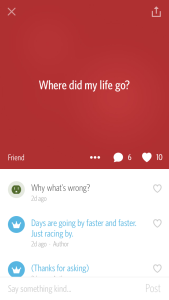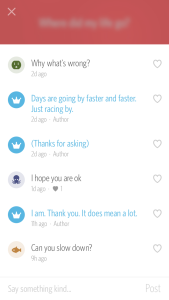“As long as the roots of relationship are not severed, all is well. And all will be well in the community’s garden. There will be growth in the spring!”
— Chauncey Gardiner, from Being There
I am a proponent of “real name” communities. I am also a proponent of safe communities — and real name accountability tends to civilize people’s behavior online in a big way.
It’s like taking the glory suit off of the Klansman. That said, are anonymous communities more authentic?
Maybe. After three years of enforcing real name on Google+, Google just rescinded its real name policy, thus ending the Nymwars. Reddit, Twitter, most message boards, and even Facebook (if you’re smart) allow anonymity.
To me, anonymous communities are as dangerous as they are wonderful — and whether they’re worth the risk really needs to be up to you.
The death of Robin Williams yesterday has powerfully, and rightfully, return the focus of our conversation to community, mental health, bullying, depression, and the nature of true nature, authenticity, and anonymity. Facebook, Twitter, Reddit, Google+, Tumblr, and an infinity of forums and apps churned in response to Robin Williams’ suicide.
Was there single event that drove Robin Williams to take his own life or was it a culmination of a million things? Was it situational or chemical? I don’t think we’ll ever know. Can someone be driven to suicide? Goaded? Bullied. I believe yes. Desperate times call for desperate measures, is how the saying goes for a reason.
 There’s been a lot of controversy about the new VC-funded app called Secret. I assume it was directly influenced by PostSecret, though Frank Warren wasn’t involved and is quite critical of it. Secret and Whisper are apps that enable us, our friends, and our friends of friends to anonymously share the secrets of our lives. I played with Secret a lot over the weekend after stumbling into a very critical article on PandoDaily (never heard of them before). Secret is a den of abuse, cyber bullying, and coerced suicide, according to their series of articles.
There’s been a lot of controversy about the new VC-funded app called Secret. I assume it was directly influenced by PostSecret, though Frank Warren wasn’t involved and is quite critical of it. Secret and Whisper are apps that enable us, our friends, and our friends of friends to anonymously share the secrets of our lives. I played with Secret a lot over the weekend after stumbling into a very critical article on PandoDaily (never heard of them before). Secret is a den of abuse, cyber bullying, and coerced suicide, according to their series of articles.
I don’t disagree. In fact, I agree wholeheartedly. Personally, I am afraid of Reddit. I am sure I would be eaten alive, especially if anyone found out I was a PR and marketing professional — a shill.
But I really love Secret — I can’t help myself. At least for now, it’s so voyeuristic. And, the excitement of these confessions coming from my friends, even if once-removed, is part of the thrill.
 And even I had a poignant moment on Secret. I posted “Where did my life go?,” white letters emblazoned on a red background. My intention was so simple: it seems like time goes faster for me every day. It was a real secret, though it was more of a expression of “holy crap” than a call for help, intentionally. And, instead of being cyberbullied, I received the most beautiful words of kindness, understanding, compassion, and concern. I was amazed. They were treating me with kids gloves, they were making sure I was OK, that I was going to get through the day in once piece. I was amazed and honored.
And even I had a poignant moment on Secret. I posted “Where did my life go?,” white letters emblazoned on a red background. My intention was so simple: it seems like time goes faster for me every day. It was a real secret, though it was more of a expression of “holy crap” than a call for help, intentionally. And, instead of being cyberbullied, I received the most beautiful words of kindness, understanding, compassion, and concern. I was amazed. They were treating me with kids gloves, they were making sure I was OK, that I was going to get through the day in once piece. I was amazed and honored.
They’re some of the sweetest words.
And maybe because those are the sort of people I know, the sort of friends I have. They didn’t know that it was me who said that, they just assumed that words like that, just five of them, can really be important words. Words that speak of and warn to so much more. They were checking in on me to make sure I was OK, to make sure I wasn’t suicidal.
What’s more, I have found that I like the inner most innermost of these people who mostly only post cat and baby photos on Facebook.
I have spent hours on it reading, in rapt engagement, the most scintillating and jaw-dropping admissions of guilt, fear, passion, regret, disgust, bliss, lust, unrequited love, anger, rage, resentment, fear, grandstanding, trolling, bragging, and any number of other admissions under the promise of anonymity (though you should know that anonymity on all these apps just means veiled — and only veiled to other users, not to the app — even if you refuse to give Secret your email or phone number).
People are mean and terrible to each other but also wonderful, heartbreaking, raunchy, passionate, afraid, funny, admirable, reprehensible, too. And, people have always aspired towards anonymity as a way of protecting their real self, their families, their responsibilities, and their own personal, community, and professional reputation.
Case in point, 12-step groups like Alcoholics Anonymous, though since those meetings are in person and only have the very shallowest of anonymization possible (uh, I can see you! And, if I see you on the street, I will recognize you; and, if I lifted your wallet, I’ll know who you are).
To many, anonymity has nothing to do with being duplicitous or lying, it has to do with being more honest. Potentially painfully so. About everything. The recent spate of secret sharing apps are just the next in a long line of these very raw platforms, including the most recent cyberbullying platform, Ask.fm.
Before the advent of the Internet, folks needed to physically move places to find birds of a feather—people like them. Affinity groups were hard to come by, so if you were smart, you’d go away to college; actors went to LA, writers went to New York; if you happened to be alt-boy or alt-girl, then the cities called, or Europe.
Birds of a feather flock together, after all—everybody hungers to find others like them. Post-internet, nothing has changed for some people—plenty of smart kids still flock to Boston every year—but everything’s changed for lots others.
Many of my friends attend Buring Man. People feel self-actualized there. They discover something in themselves they might never have know was there — or, have always know is there but never felt comfortable expressing within the confines of the normal world. It freaks me out and I would never go. No interest and a lot of trepidation. I don’t want to get naked, I don’t want to do drugs with strangers, I wouldn’t know where to look or what to do. I am perfectly happy in conventional, traditional, society, and try to avoid any situation where things can physically get out of control. I feel the same way about reddit. I am a proud square. I spend a lot of my time avoiding shameful, vulnerable, and dangerous situations, neighborhoods, watering holes, too late nights, excesses in drugs or alcohol. I am an adult and need to protect myself more than I need you to protect me.
Even though I am a 44-year-old, six-foot-three, more than a couple-hundred pounds, white male who is quite strong, I spend a lot of my time being hyper-situationally-aware, minimizing risk, and always assuming that the world is conspiring to kill me.
Last Sunday, in the New York Times Sunday Magazine, there was an article titled The Driver by René Steinke. It’s about a woman who was in her head, grieving, after putting her told dog down. She just walked out into the crosswalk and was hit by a bus. She had the right of way, the light was her’s, the sign was walk, so she just pushed out into the intersection — and she was hit by a bus. And, the police ruled it as an accident and the bus driver didn’t even receive a ticket. She’s suffering terrible PTSD. Rightfully so.
That said, ultimately, René is the only person responsible for maintaining René’s long life. No, I am not blaming the victim here. I am just saying that self-preservation is build into us — or should be. It’s not, though, for many. I live in DC and routinely see pedestrians, bicyclist, and motorcyclists routinely putting their fragile, vulnerable, lives into the hands of people who are not paying any attention to them at all, being consumed with their own rage, their own dog’s death, their own cell phone distraction, and the fact that we’re really all just going through the motions.
I bought my first computer in 1983 and even back then, folks were in search of each other at the end of the beep beep beep tone of a 300 baud modem. That beep beep beep screech was the sound of folks searching for and finding each other.
Online communities are an extension-of-reach of this same desire to find people and connect with them. Even if the person you see when you wake up doesn’t get you, even if your parents and those losers at school don’t get you, even if you have a deep secret, you are never stuck—you can supplement the demands of your daily commitments with people who don’t merely come close to meeting you on the same general ground of interest but your exact twin.
When you meet your twin—when you meet lots and lots of people just like you—you are then free to be open and honest. Everyone understands you . . . better than your own mum. You have time to bond, connect, and simply spend time together.
I’m talking about self-organized, self-sustaining communities of purpose, communities of action, communities of circumstance, communities of interest, communities of inquiry, communities of position, communities of place, and communities of practice—real people, bonded into a tribe, protective of the members of their family. I will say that the Second Life community takes care of its own. They love each other, they protect each other, they take care of each other, and they stick up for each other.
Even in 2014, Second Life is a exemplar of how and why online communities are authentic—even though one can (and often does) hide behind a posh and dead-sexy avatar and a posh and dead-sexy nom de plume. Second Life might even be more authentic because it allows members to cast-off the shackles of family names and the genetic inheritance of body and shape, and redefine oneself as one desires to be—arguably, as one is more authentic on Second Life, where one may become the man or woman (or purple pony) that one is on the inside.
Marketers need to recognize that every Second Life (SL) and World of Warcraft (WoW) avatar is a person pouring time and resources into community, that every tweet by every tweeter through every Twitter handle is a person who has taken finite time and resources and poured it into community, and every blog post by every blogger are time, energy, and resources that could be spent elsewhere and elsewise, are spent on the blog and this time and energy is shared with the blogger’s community in comments and conversation.
These are really wonderful people who actually are willing to meet you halfway towards friendship. They’re not an exclusionary boarding school, they’re an “inclusionary” public school—open to everyone! I’m not playing “tra-la-la” here, however, because even in a school with open admissions, there are groups of smart kids, cool kids, quiet kids, trolls, lurkers, and losers. As a marketer or as a corporate entity, you enter the online world as the new kid. Folks are, by their very nature, skeptical and you will probably be approached and challenged to see where you are in your intent, where you are in the pecking order, and which table you’re going to have lunch at.
If you want to become part of the conversation, if you want to market or engage with online communities and online citizens, if you want to leverage their reputation and tap their community and influence, you need to make the same sort of real effort that you would if it were neighbors in your new neighborhood, if it were parents in the PTA, or even all of the editors, writers, and journalists you currently covet in the big rolodex cheese wheel you still maintain on your desk as the only representation of how powerful your years of work have made you.
What does it all mean?
- Virtual community is not fun and games, really—it’s serious business just the same way that the Red Sox might seem like a game but it’s serious business. Mess with the Sox and you’re messing with Boston.
- When someone enters a community online, you’re not just dealing with people who happen to live in the same city or neighborhood, you’re dealing with people who have filtered to that online space from around the entire globe.
- Finally, if you engage, you’re not on holiday—even when you’re on holiday you’re not on holiday because all of the people you meet wherever you are—even on holiday—are real people. Just because the people around you in Hawaii make you feel loved and adored, you’re still a paycheck to them.
I promise you that if you’re willing and able to do the above, you will have a rich and rewarding experience—you, your brand, and your company.
Feel free to email me at chris@gerr.is or call me at +1 202-351-1235
Learn more about Chris Abraham at Gerris digital.




